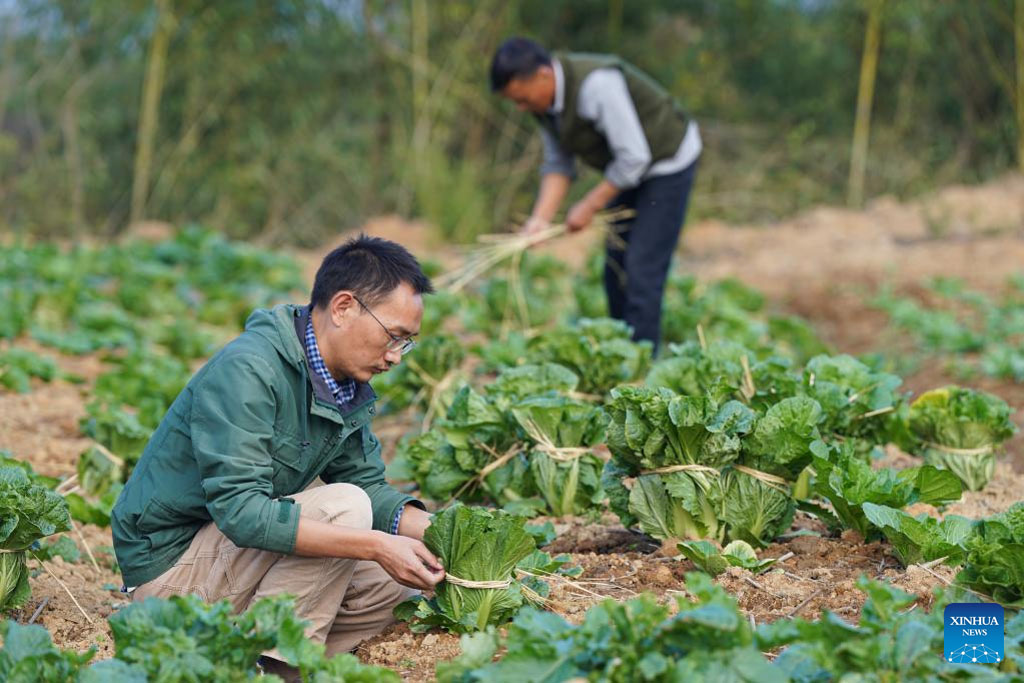Across China: New farmer boosts rural development with "mystery veg box"

A pleasant surprise has magical power. From cosmetics and toys to food, the craze for blind boxes, or mystery boxes, has gripped consumers, especially the young generation, for a paid gift that bears some uncertainties.
Now a young man in east China's Anhui Province has put a fresh item into the magic box -- vegetables.
A typical day for Zheng Tao, 34, is spent with vegetables. His "mystery veg box" contains seven to eight randomly selected varieties of seasonal vegetables, which are freshly packed and will appear on consumer tables the next day.
Zheng offers two types of veg boxes: 2 kg and 4 kg. All vegetables are planted in the open air without chemical fertilizers or pesticides.
"The amount of each variety of vegetables is just enough for one or two meals to avoid waste," said Zheng, who quit his job in the city to become a new farmer in his home county.
The idea of the mystery veg box came into being by accident. In July 2021, the vegetables in Zheng's parents' garden were ripe with some surpluses. Therefore, he shared some pictures of the vegetables on WeChat, a popular social media platform in China.
"I got four to five orders in a couple of minutes," Zheng recalled, adding the vegetables received very positive feedback.
"The majority of my customers are young urban dwellers. These home-grown vegetables remind them of the taste of their hometown and childhood, and the quality is much better than those sold in supermarkets with prices halved," he said.
Two weeks later, Zheng commenced his veg box business. At its peak, Zheng sold more than 200 blind boxes daily. It is more than 600 kg of vegetables. To meet the booming demand, the new farmer rented 32 mu (about 2 hectares) of abandoned land in July 2022 and began cooperating with local villagers.
"Farmers nearby have been growing vegetables their entire life. They know how to produce premium-quality vegetables," Zheng said. So far, he has signed contracts with over 60 households, helping them increase income and a sense of fulfillment.
"Previously, the surplus vegetables were used to feed pigs, or we just left them to rot in the field. Now, thanks to Zheng, I gained an extra 6,800 yuan (about 1,000 U.S. dollars) in 2022 from selling these vegetables," said Hu Jianxin, 64, a farmer in the nearby Zhongshan Village.
The innovative business has also provided new looks in the county. "The local rural landscape has also had a 'face-lift' as more wastelands are tilled. Local villagers are also motivated," said Zhou Taotao, head of the rural revitalization work team in the nearby Fengwu Village.
Some people even come from afar to visit Zheng's gardens, bringing new business opportunities, such as eateries and homestays.
Zheng has already set two goals for his business.
His short-term goal is to renovate some idle houses and transform them into pickle-processing workshops.
"Pickle-making is a local tradition. I want to carry it forward to help villagers increase their income," Zheng said.
In the long run, Zheng wants to build a farming complex where customers can sow, pick, and even process vegetables by themselves.
"Many white collars are tired of the fast-paced life in cities. Here, we can indulge them with all the beauty and leisure provided by nature to give them a break," Zheng said.